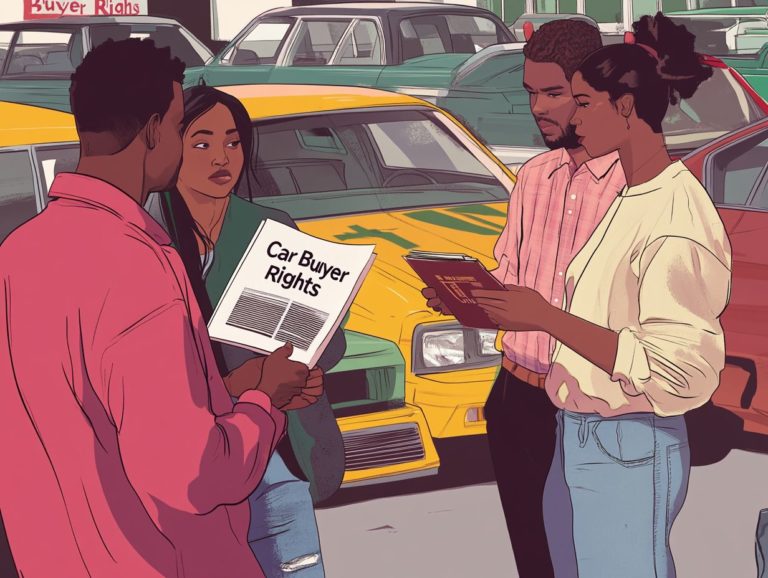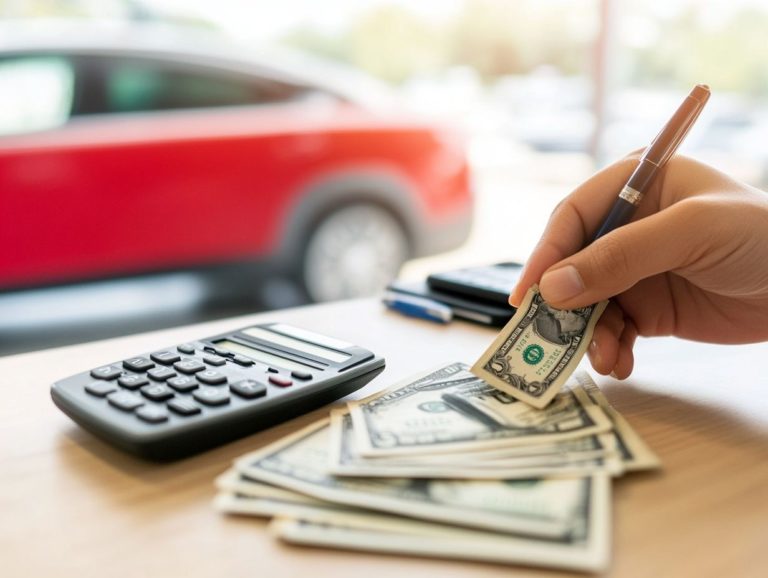How to Handle a Car Loan After a Divorce
Divorce can be an intricate journey, and when it comes to managing shared assets like car loans, the complexity multiplies. As you navigate this process, determining who retains ownership of the vehicle or how to address any outstanding loans becomes essential.
This article delves into the implications of divorce on car loans, presenting practical solutions such as refinancing, transferring ownership, or selling the vehicle. You ll find a thorough discussion of the necessary steps for each option, along with potential challenges and crucial considerations to keep in mind as you make your decisions.
Contents
- Key Takeaways:
- Overview of Car Loans and Divorce
- Options for Handling a Car Loan After Divorce
- Transferring Ownership
- Selling the Car
- Steps to Take for Each Option
- Process for Refinancing
- Process for Transferring Ownership
- Considerations and Potential Challenges
- FAQs: Common Questions About Car Loans After Divorce
- What happens to a car loan after a divorce?
- Can I remove my ex-spouse’s name from the car loan after a divorce?
- What happens if my ex-spouse stops making payments on the car loan?
- What are my options for handling a car loan after a divorce?
- What should I do if I can’t afford the car loan payments after a divorce?
- Is it possible to transfer a car loan to my ex-spouse after a divorce?
Key Takeaways:

Before making any decisions about a car loan during or after a divorce, it is important to understand how divorce can impact the loan and to consider the potential financial and legal implications.
If you and your ex-spouse have a car loan, you have three main options for handling it: refinancing, transferring ownership, or selling the car. Each option has a specific process that should be followed.
Communication with your ex-spouse and careful consideration of your financial situation are key when handling a car loan after a divorce. It may also be helpful to seek legal advice to ensure all aspects are properly addressed.
Overview of Car Loans and Divorce
Navigating car loans during and after a divorce can be quite intricate, presenting you with significant decisions about joint debt, vehicle ownership, and asset division.
When couples part ways, it becomes crucial to grasp how divorce impacts existing car loans, including responsibilities linked to the car title, available payment options, and the potential effects on your credit score.
Seeking legal counsel and utilizing mediation can be invaluable in fostering amicable arrangements regarding the car loan, especially when it comes to dividing marital assets and managing joint debt in alignment with the separation agreement.
Understanding the Impact of Divorce on Car Loans
The impact of divorce on car loans can profoundly influence your financial landscape, especially concerning joint debt and credit scores.
When a couple separates, their financial obligations often extend to shared assets like car loans. The divorce decree might clearly outline who is responsible for the payments and the specifics of ownership. However, complications can arise if both parties remain liable for the debt.
If timely payments aren t made, it can negatively affect the credit scores of both individuals, regardless of who primarily uses the vehicle. This situation can complicate future financing options for each of you.
Therefore, it s crucial to maintain open lines of communication regarding payments and ownership transfers, ensuring financial stability as you navigate your new lives.
Options for Handling a Car Loan After Divorce
After a divorce, you have a range of options for managing your car loan. You might consider refinancing the loan to better suit your new financial situation, transferring ownership to the appropriate party, or even selling the car to settle any joint debts.
Each choice carries its own implications, so it s essential to weigh them carefully to determine the best path forward.
Refinancing the Loan
Refinancing a car loan after divorce can be an astute strategy for managing joint debt and securing a more favorable interest rate based on your individual credit score. This approach not only alleviates some of the financial burdens that may have emerged during the divorce but also paves the way for you to regain control over your financial future.
As you navigate the refinancing process, consider how your payment history and current credit score will impact the terms you receive from lenders. A solid payment history can lead to significantly lower monthly payments, presenting both parties with an opportunity to bolster their financial well-being.
By opting to refinance individually, you can ensure that the vehicle is exclusively tied to the responsible party, fostering greater transparency and accountability as you move forward.
Transferring Ownership

Transferring ownership of a vehicle is a common consideration after divorce. It allows one ex-spouse to keep the vehicle while ensuring the other is free from the burden of the car loan.
This process typically begins with both parties reviewing their separation agreement to confirm the terms regarding the vehicle.
The primary steps you ll need to follow include:
- Obtain a signed title transfer document. This is crucial for legally rerouting ownership.
- The unique number that identifies your car is essential here, as it ensures the correct vehicle is being transferred.
- Once you have the title secured, notify the lender right away to avoid complications if the car is financed. The loan may need adjustments to reflect the new ownership.
Completing these steps diligently helps you avoid any future legal complications.
Selling the Car
Selling the car can be a smart move for couples aiming to alleviate joint debt and take control of their financial futures post-divorce.
By converting a vehicle into liquid assets, you can navigate the often-complex landscape of settling joint property issues more effectively.
To determine the vehicle’s value, conduct thorough research. Check market rates and utilize online appraisal tools to ensure you arrive at a fair sale price.
The proceeds from the sale can then be strategically allocated. Perhaps to pay off outstanding debts accumulated during the marriage or to restructure financial obligations according to the settlement agreement.
This approach offers immediate financial relief and encourages a smoother transition into your separate financial lives.
Steps to Take for Each Option
Each option for managing a car loan after divorce demands careful consideration and a clear understanding of the associated processes.
Whether you choose to refinance, transfer ownership, or sell the car, each path requires specific steps to navigate effectively.
Process for Refinancing
The process of refinancing your car loan typically begins with a careful assessment of your current loan terms. Compare offers from various lenders to identify potential savings and determine whether better rates or terms are available.
Next, gather the necessary documentation. This includes proof of income, your credit history, and details about the vehicle itself. A strong payment history can enhance your appeal to lenders, showcasing your reliability.
Keep in mind that interest rates can fluctuate between lenders due to different risk assessments and market conditions. Shop around diligently to secure the best possible deal.
Process for Transferring Ownership
Transferring ownership of a vehicle involves several crucial steps. These include updating the car title and ensuring the unique number that identifies your car is accurately reflected in the new ownership documentation.
To kick off this process, as the current owner, complete the necessary sections on the title. Provide accurate details about the buyer and the sale price.
It’s also essential to obtain a bill of sale that clearly outlines the terms of the transaction. This acts as proof of ownership transfer.
Seek legal advice to reduce future disputes, particularly for individuals navigating a separation agreement. This ensures all legal documentation complies with state regulations and addresses any unique circumstances surrounding the transfer.
This thorough approach protects your interests and makes the process smoother!
Process for Selling the Car

Selling your car starts with assessing its current market value. This step is vital for securing a fair price and managing any debts effectively after a divorce.
To evaluate your car s worth, you can use online valuation websites, browse classified ads for similar vehicles, or even consider hiring a professional appraiser.
Once you ve identified the vehicle’s value, you need to decide how to sell it. You can either go for a private sale or opt for a trade-in at a dealership. Each option has its benefits: private sales often yield a higher price, while trade-ins can simplify the process.
When dealing with shared property agreements, it s crucial to discuss how the sale proceeds will be divided. This ensures a fair resolution for everyone involved.
Considerations and Potential Challenges
Divorce brings many challenges, especially regarding car loans. Communicating effectively with an ex-spouse about shared responsibilities is essential.
Approach these discussions clearly to avoid misunderstandings. Both parties should understand their obligations and work towards mutually beneficial agreements.
Financial Implications
The financial implications of managing a car loan after divorce can significantly affect your credit score and debt management strategy.
Divorce often results in substantial changes in financial circumstances. It’s essential to remain vigilant and proactive about your credit standing.
Debt obligations like car loans can become entangled, impacting both your current financial health and future credit opportunities.
Maintaining a positive payment history is crucial. Each late payment can chip away at your score. If you handle your debt poorly during this transitional period, you risk long-term consequences, like higher interest rates and challenges in securing loans later.
This can create a cycle of financial strain that s hard to break free from.
Legal Considerations
Legal considerations surrounding car loans during divorce depend on the stipulations in your divorce decree and separation agreement. The divorce decree is a legal document that outlines asset division.
Understanding these legal intricacies is essential for you and your ex-partner. The decree not only guides who gets the vehicle but also impacts responsibilities related to the existing loan, including payment obligations and title transfer.
It s crucial to inform the lender about any ownership changes post-divorce to ensure compliance with loan terms.
Having clear asset division terms in the separation agreement can help avoid future conflicts, providing a framework for each person s rights and responsibilities regarding the vehicle.
Communication with Ex-Spouse
Effective communication with an ex-spouse is vital for navigating car loans and reaching an amicable settlement.
By fostering a collaborative atmosphere, you and your ex can openly discuss financial obligations, particularly regarding joint debts. This transparency builds trust and ensures both parties understand their responsibilities regarding shared assets like vehicles.
To facilitate these important conversations, consider utilizing mediation sessions for a neutral space that encourages constructive dialogue. By listening to each other s concerns and being open to compromise, you can achieve better outcomes, simplifying agreements on payment plans or asset division.
FAQs: Common Questions About Car Loans After Divorce

What happens to a car loan after a divorce?
In a divorce, shared debts, including car loans, need to be settled. Both parties may still be responsible for the loan, even if one person keeps the car.
Can I remove my ex-spouse’s name from the car loan after a divorce?
Usually, you can’t just take your ex-spouse’s name off the car loan. You ll need to take out a new loan in your name only, which might involve a credit check and possibly a higher interest rate.
What happens if my ex-spouse stops making payments on the car loan?
If your ex stops making payments, it could hurt your credit score. You might also be responsible for the loan, so keep an eye on it and consider legal action if needed.
What are my options for handling a car loan after a divorce?
If both names are on the loan, you can sell the car and split the proceeds or let one person buy out the other. If only one name is on the loan, that person can keep the car and the loan or opt to take out a new loan in their name only.
What should I do if I can’t afford the car loan payments after a divorce?
If you’re having trouble paying, try negotiating a lower monthly payment with your lender. Selling the car or restructuring the loan could also help reduce payments.
Is it possible to transfer a car loan to my ex-spouse after a divorce?
You might be able to transfer the loan to your ex s name, but this requires the lender’s approval. Always consult with your divorce attorney they can guide you through this process!






